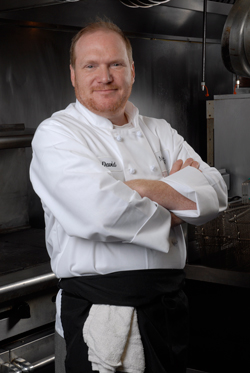My first experience with truly professional waiters was in 1995, when I moved to New York City to work at La Grenouille. La Grenouille is a very special restaurant, the last of the Grandes Dames that defined the restaurant scene in New York after Le Pavillion, the great French restaurant which came out of the 1939 New York Worlds Fair. It was an entirely masculine restaurant, from front to back, aside from some office staff and the coat check “girls”. The first day I tried out for the job, every waiter stopped by and introduced himself to me, and shook my hand. It was mind-bogglingly civilized, and the experience remains with me to this day. Restaurant people spend an inordinate amount of time together at the worst hours, and to have this introduction to service — simply treating others well — affected my way of working from then on. What was interesting is that days before, I had eaten at Restaurant Daniel, the New York Times Four Star Restaurant, and had what is today still the most memorable meal of my life in terms of the food, and some of the rudest service I had ever had. Restaurants themselves have individualized cultures, and I eventually learned that there was for me a great difference between the two restaurants.
Once, some seventeen years ago, I was interviewing at a restaurant with the Chef de Cuisine. I spent the day with her, and she was extremely good, but exhausted to the depths of her soul. She made a comment that has always stayed with me, “Cooking is a selfless act”. I think that if one recognizes that cooking is part of the whole service experience, one can say that “Service is a selfless act”. One must get out of ones own way and be attuned towards the other. Kindness, caring and compassion are blended with professionalism, expertise, and putting oneself on another’s agenda. The balance, however must be to not sacrifice one’s own well being: if you do not take care of yourself, you cannot be present for the other. I felt her exhaustion, and something felt wrong. I did not pursue a job with them based on the weight on her soul. I was unconscious of it, but I intuitively knew that I could not have that experience.
What I have come to understand is that service is never just about taking care of the customer. In my role as a chef, I view my job as making sure my employees have the skills and tools to do their job. If they do not, that is a failure on my part. I cannot take care of the customer if my employees do not have what they need. So, I have a responsibility to serve the greater needs of the entire community: the customer, the employees, and my colleagues. This is a paradigm shift: in pure service, there is no person above the other. Service is instead a relationship. We are all in relationship with each other, and in different ways serving the needs of each other. There is a code to being responsible to each other. This is why entitlement from a customer can be so frustrating. Your money does not buy my essence, all that it buys is the transaction. It is our common humanity, our inherent equality, that is the reason I will be generous of spirit.
I have always found the details of service to be great fun, when one knows them. There is pleasure in knowing the essential aesthetics of a cultural norm. My Grandmother Shewmaker would say, “The reason why the rules are there are just so that people will know what to do.” As a woman with a mental illness, she saw that clearly. In times of revolution — for instance, the social revolution of the ’60’s — society is shaken because the norms are thrown out the window. As a child I would get mad at my little brother when he set the table and didn’t put things the way they were supposed to go: the fork on the left, the knife facing in on the right, the spoon on the outside of it. It was about meeting expectations. People find comfort in the familiar, in knowing the rules, in knowing how to behave. To this day I find myself frustrated when the most basic of rituals are not followed. At the last place I worked, the silverware was set on the wrong side, and I just bit my tongue. I remember eating at a restaurant many years ago, and they had put kosher salt in the salt shakers, and you couldn’t get the salt out. I told the owner, who I happened to work for at another restaurant, and all he did was give a patronizing laugh. I did not continue to work for him, because that attitude was reflected in all of his working relationships. Why would you not care about the experience of another? If a customer’s expectations aren’t reasonably met, there will be conflict within the relationship. By the same token, if a waiter is clear with the customers at the outset that there might be problems with service, or know how to nip things in the bud appropriately, it is incumbent on the customer to honor that. These things matter, because at the end of the day, it is about the rituals that we live with, the underlying rules, that give a society structure. It does not matter if you are in a primitive tribe, or a sophisticated nation, groups of people have basic and subtle rules that they live by. Even when one is a radical protester, there are social norms: you cannot accomplish things without being attuned to them, even if within their own group they have to design the architecture of their society. Not having silverware when the food comes out, or not having cream and sugar already there for the coffee, is a rupture because one person is breaking the constructs by which society lives. This is not petty nor is it what one might dismiss as a First World Problem. It truly is about being a person in full relationship with others. I used to tell my people, if a customer asked for mayonnaise, and we did not get it out to them immediately, they would be sitting with food in front of them getting cold. It does not work. It creates disharmony.
Awareness of the direction of the knife at a setting says volumes about a persons awareness of others. This is why it matters. This is what service is.




David, this is beautifully insightful. My 19-year-old daughter is currently working as a hostess at a high-end restaurant in Mystic which doesn’t have a healthy work culture. I’m going to share this with her.
Hi, Craig! So good to see you at Glen Echo when the Squirrels played. Next time you are in town we have to make some time to hang out!
Unfortunately, unhealthy work cultures abound. I recently interviewed for a position, and the General Manager kept me waiting in the lobby for half an hour without informing his staff that he was running late. He made no excuses for his tardiness, and it was clear afterwards that if he was going to be dismissive to a person who wasn’t even an employee, I did not want to get involved in the kind of power plays that he would bring to the actual work relationship.
I have not read the whole book, but Danny Meyer writes about hospitality in business: http://www.amazon.com/Setting-Table-Transforming-Hospitality-Business/dp/0060742763 I had been articulating and practicing a lot of the ideas at my old job at Meridian Pint, such as start by treating your employees with decency, and it was something that I worked to inculcate in the culture of the kitchen. I was by no means perfect — I experienced the soul draining that I discuss in the above piece– and I was on occasion inappropriate, do to being over-taxed, much to my chagrin. But I came in with this belief system, and it is a matter of “progress, not perfection” as the saying goes, and when one is in the wrong, owning it, rectifying it and growing from mistakes is essential. I had conflicts, but the people I had conflicts with I have tremendous respect for, because we worked through it. My boss discovered the above book, and I think he really bought into it. It was great to watch him grow as a business owner, and great to be a part of his team because of his willingness.
By the way, La Grenouille won the James Beard Outstanding Service Award in 2012.